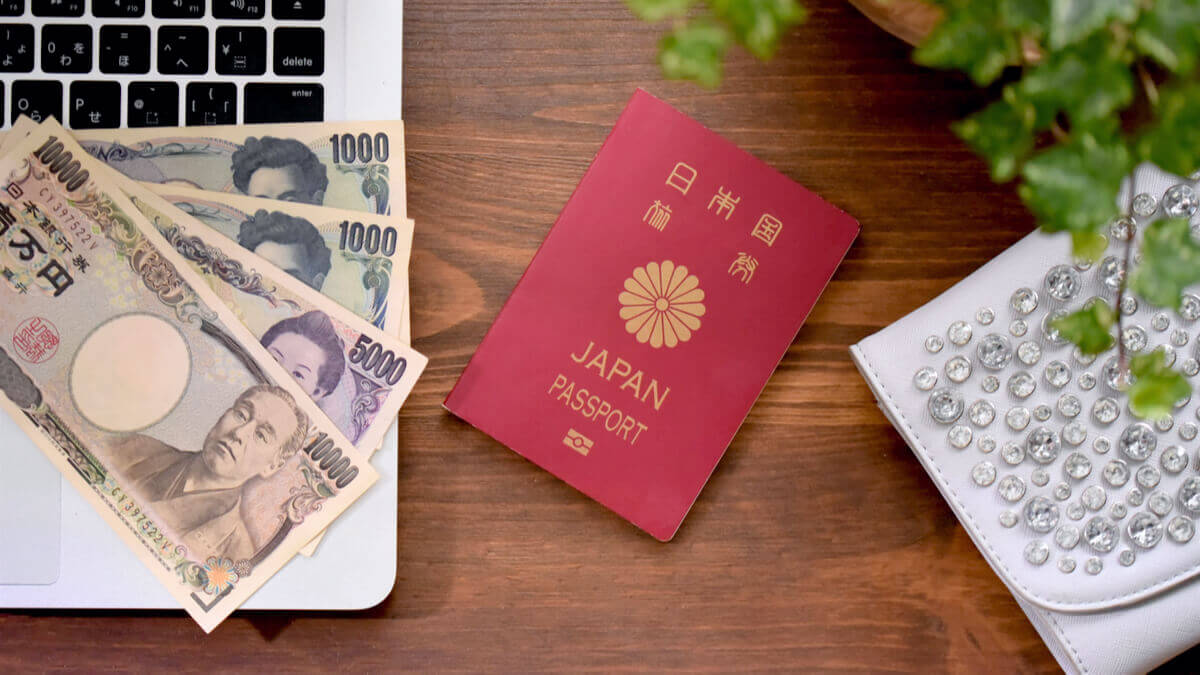How to open a bank account in Japan as a foreigner: US guide
Learn all about opening a bank account in Japan as an American, including costs, requirements, and alternatives.

Do you live and work in Japan — or have Japanese heritage? You might be interested in how to get Japanese citizenship, or whether Japanese dual citizenship with the US is possible. This guide has you covered.
We’ll walk through how to get Japanese citizenship, and how that would impact your status as a US national, to help you figure out whether applying for Japanese nationality is right for you. We’ll also highlight Wise as a smart way to save money when you hold, send and spend foreign currencies — perfect if you’re planning on connecting with your Japanese roots.
| 📑 Table of Contents |
|---|
Japanese citizenship is governed by the Japanese Nationality Law. Under this law, there are provisions for people to become Japanese citizens in a number of ways:
1. You can become a Japanese national by birth
2. You can become a Japanese national by acquiring citizenship as a child
3. You can become a Japanese national by naturalization
It’s also possible to be granted Japanese citizenship due to rendering meritorious service to Japan — although this is not commonly used.
The eligibility criteria for each path to Japanese citizenship are complex, so you’ll need to double check the full details for your situation. However, broadly speaking you can become a Japanese national in the following ways:
| Eligibility type | Criteria |
|---|---|
| Japanese national by birth |
|
| Japanese national by acquiring citizenship as a child |
|
| Japanese national by naturalization |
|
Let’s take a look at how to naturalize as a Japanese citizen.
To become a Japanese citizen you’ll need the permission of the Minister of Justice. However, your journey will start at your local Legal Affairs Bureau, assuming you’re in Japan already. If you’re not in Japan yet, you should contact your local Japanese embassy or consulate for advice².
| 🎯 Here are the basic steps you’ll need to take if you’re naturalizing as a Japanese citizen within Japan: |
|---|
| 1. Gather the full set of documents to support your application |
| 2. Visit your local Legal Affairs Bureau to file your application |
| 3. The application will be checked and you’ll be invited to an interview at the Legal Affairs Bureau |
| 4. If your application is approved locally it is passed to the Minister of Justice to confirm your permission to naturalize |
| 5. Your naturalization is officially announced in the Gazette |
| 6. You’ll receive a naturalization certificate and will need to hand back your alien registration card |
| 7. Add your name to your family registration and make any changes to your legal status required by your bank and other organizations |
Pulling together all the documents needed to start the naturalization process can take time. You’ll need the following:
|
|---|
Note: double check the exact requirements for your situation early on in the naturalization process, as the paperwork needed can vary a little depending on the basis of your application.

OK, so now on to one of the key questions: can a US citizen have dual citizenship with Japan?
You may already know that the US allows dual citizenship — however, this relies on the other country involved also acknowledging dual citizen status. Japan does not allow dual citizenship, and so you can not jointly hold US and Japanese nationality³.
If you’re born in the US to Japanese parents, and therefore hold US citizenship automatically, you’ll have to choose between acknowledging your Japanese nationality, or retaining your US citizenship before you’re 22 years old. If you are a Japanese citizen and you naturalize as a US citizen you’ll have to formally renounce your Japanese citizenship by notifying your local Japanese embassy of your change in status.
If you need simple, low cost, easy to send international payments - or you manage your money across borders — you need Wise and the Wise Multi-currency Account.
With Wise you’ll be able to send international payments all over the world, using the mid-market exchange rate and for just a low, transparent fee. You can also choose to open an online Wise Multi-currency Account for free, to hold and manage balances in 50+ currencies, spend with your linked debit card, and switch from one currency to another whenever you need to in the Wise app. You’ll get the mid-market exchange rate with no hidden fees, every time — which can mean you save 3x compared to using your bank for foreign currency transactions.
💰 Start saving on international payments
Please see Terms of Use for your region or visit Wise Fees & Pricing for the most up to date pricing and fee information.
If you’re not ready to follow the path to Japanese citizenship you can still live and work in Japan as long as you have the correct visas and paperwork in place. The best way for you to get to Japan will depend on your personal situation, whether you’re planning on working or studying, and how long you think you’ll stay. You can get information and resources online, and from the Japanese Embassy in the US⁴.
If you’re already in Japan on a visa, and are looking to stay for the long term, it might be worth checking out if you can apply to be a Japanese permanent resident.
This status comes with a few benefits over holding a visa or work permit. You won’t need to reapply every year or two, you can work for any employer you like without needing to adjust your visa status, and you may even get favorable treatment from Japanese banks to get loans and credit more easily.
| Intrigued? Learn all about becoming a Japanese permanent resident |
|---|
Unfortunately you will not be able to hold Japanese dual citizenship with the US. If you’re entitled to both US and Japanese citizenship at birth, you’ll have to choose one or the other by the time you’re 22 — and if you naturalize as a US citizen, you’ll need to renounce your Japanese nationality at the same time. Think carefully about your preferences and the options available to you — taking professional advice is often a good idea, so you’ll know the decisions you make now are right for you now and in the long term.
Sources:
Sources checked on 08.25.2021
*Please see terms of use and product availability for your region or visit Wise fees and pricing for the most up to date pricing and fee information.
This publication is provided for general information purposes and does not constitute legal, tax or other professional advice from Wise Payments Limited or its subsidiaries and its affiliates, and it is not intended as a substitute for obtaining advice from a financial advisor or any other professional.
We make no representations, warranties or guarantees, whether expressed or implied, that the content in the publication is accurate, complete or up to date.

Learn all about opening a bank account in Japan as an American, including costs, requirements, and alternatives.

Learn all about buying a car in Japan as an American, including costs, requirements, and how to import your vehicle back to the US.

Moving? Explore our blog for key insights on managing expenses, currency, and more adjustments for a successful move.

Americans love Japan. They love the unique culture, cherry blossoms, the never ending nightlife of Tokyo and of course, sushi. Japanese culture fascinates...

Whether you’re an expat already, looking for a second home for family vacations, or want a smart investment, buying real estate in Japan can be a good move....

Japan is a country with a rich history and growing economy. In certain industries, like the tech sector, booms are starting to happen. Japan is quickly...